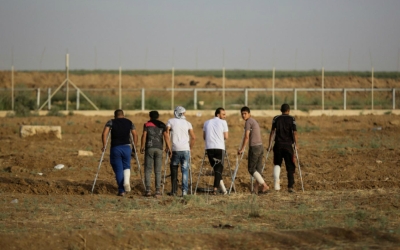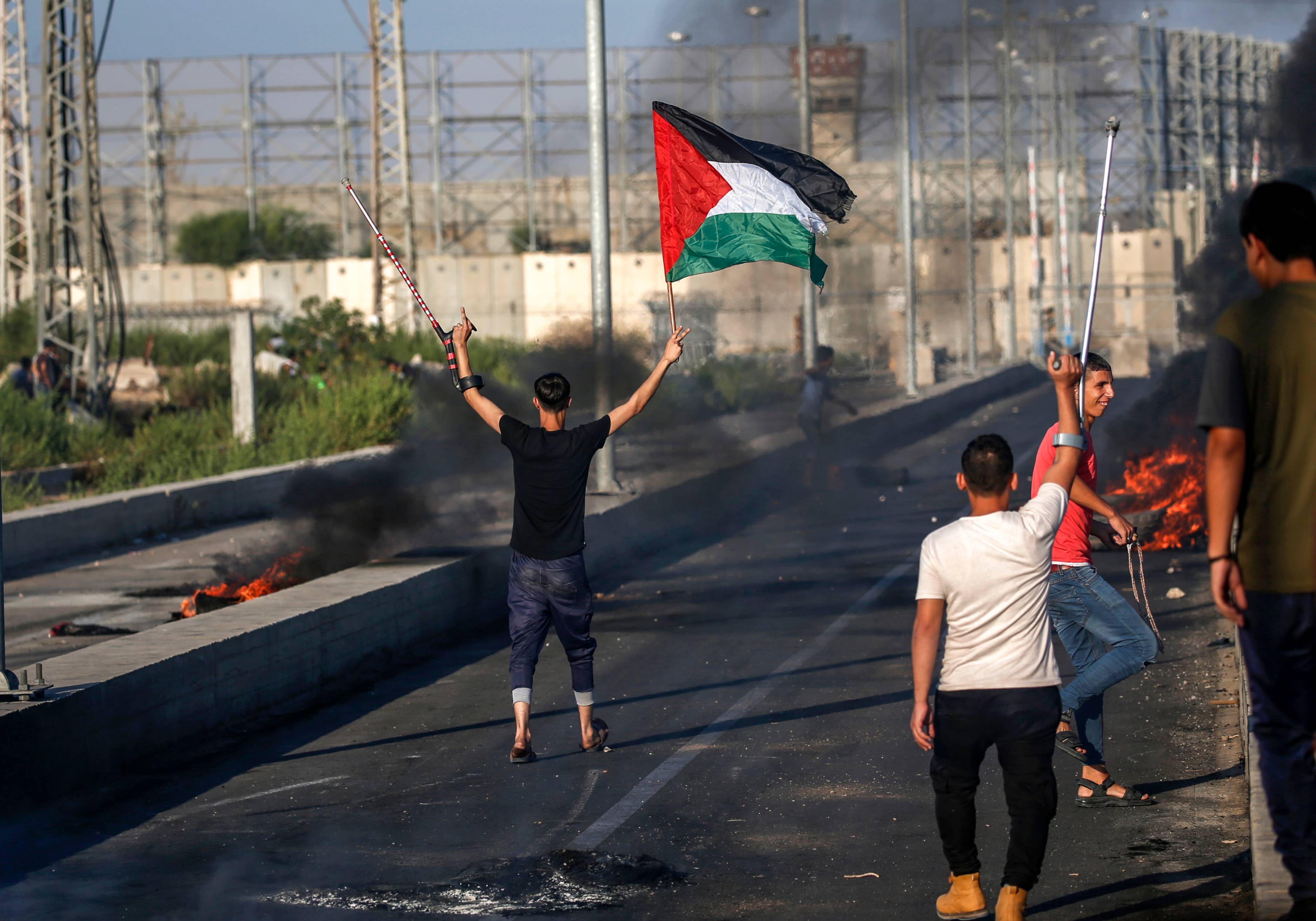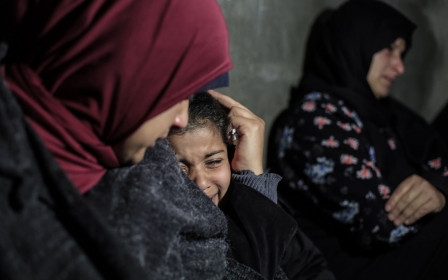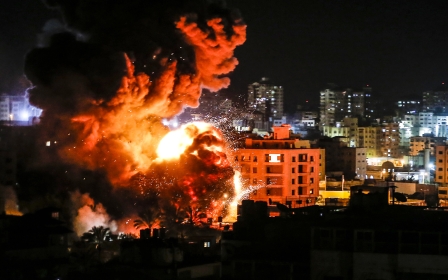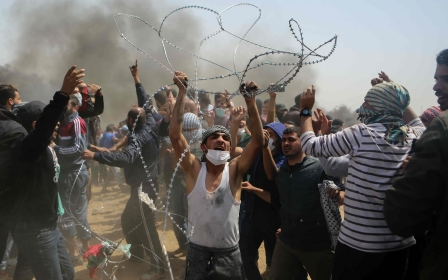Israel makes some concessions in tentative Egypt-brokered deal with Hamas

Israel has begun implementing its commitments under a tentative agreement for calm in the Gaza Strip, only days after the one-year anniversary of the Great March of Return protests in the besieged Palestinian territory.
The deal comes amid renewed tensions following Israeli forces' killing of four Palestinian demonstrators and the launch of five rockets from Gaza towards nearby Israeli communities.
Palestinian sources familiar with meetings between an Egyptian security delegation and Hamas, the de facto ruling party in Gaza, and other Palestinian factions, said a truce agreement between Hamas and Israel may be announced later this week.
The Egyptian delegation has brokered indirect talks between the two sides, with support from the United Nations and Qatar.
The sources explained that the policies implemented on Sunday were initial "gestures of goodwill" ahead of Israeli elections on 9 April. A second phase that will tackle larger issues is planned after the formation of the new Israeli government, they said.
Crossings open, fishing zone extended
Israel reopened the Kerem Shalom (also known as Karam Abu Salem) and Erez crossings between Gaza and Israel on Sunday, a week after the commercial and people crossings were closed in the wake of a rocket fired from the Gaza Strip that landed in the vicinity of Tel Aviv.
Israeli authorities have also expanded the designated fishing zone off the coast of Gaza from nine to 15 nautical miles - the furthest distance allowed since Israel first imposed a siege on the Gaza Strip after Hamas won legislative elections in 2006.
Hisham Bakr, head of the Tawfiq Cooperative Society for Fishermen, told Middle East Eye that Israel had divided the sea into three sections from north to south.
Palestinian fishermen can now sail six miles off the coast of northern Gaza - in the area closest to Israel - 12 miles in central Gaza, and 15 nautical miles off the southern coast near Egypt.
But Bakr said the fishermen could not effectively go that far, in spite of the announcement, due to a "lack of equipment necessary" to sail in deeper waters as a result of the vast restrictions Israel has placed on imports of certain spare parts and materials into Gaza.
A member of the central committee of the Democratic Front for the Liberation of Palestine (DFLP), Talal Abu Zarifa, told MEE that Israel was taking preliminary steps to "ease the siege".
Abu Zarifa pointed to the facilitation of commercial movement at the Karam Abu Salem crossing and the entry of certain items and goods previously banned by Israel for being of "dual use" as examples of that easing of restrictions.
According to informed sources who spoke with MEE on condition of anonymity, about 80 items considered of dual use will now be allowed into Gaza, including tyres.
Israel banned tyre imports after demonstrators began burning used ones during the Great March of Return to obstruct the view of Israeli snipers stationed on the other side of the boundary fence.
Abu Zarifa said Israel would also allow in drugs and equipment previously unavailable in Gaza for patients being treated for cancer and incurable diseases.
It would also take steps to grant more permits for merchants and commercial facilities to export and import products, he said.
Longer-term goals
However, Abu Zarifa explained that the tentative agreement still needed to include a programme to create some 20,000 jobs to help stem the unemployment crisis in Gaza.
He also called for an Israeli power line known as Line 161 to be reconnected and for an increase in fuel supplies to Gaza's only power plant, which could help alleviate frequent electricity shortages in the territory.
Palestinian sources told MEE that other important points would also be discussed at a later date.
That includes post-war reconstruction desperately needed since 2014; water, electricity and sanitation projects; the establishment of two industrial zones; and, should the situation in Gaza remain stable, the reopening of the long-closed Karni crossing to reduce unemployment.
However, the main obstacle to implementing such moves, they said, is funding.
Palestinian sources said that Qatar was willing to contribute between $30m and $40m by the end of the year to subsidise electricity projects, civil servant salaries and job creation.
The United Nations would also work with the European Union, the World Bank, the Islamic Development Bank and other countries to provide funding to stabilise the situation and improve living conditions in Gaza, they said.
The head of Hamas's political bureau, Ismail Haniyeh, said in statements that he had "communicated with Qatari Foreign Minister Mohammed bin Abdul Rahman".
The pair discussed the "ongoing negotiations", Haniyeh said, in order to "secure Palestinian demands, in addition to the projects [Qatar] is currently undertaking in order to address the humanitarian situation in Gaza".
According to MEE's sources, Hamas is seeking to bring Qatari funds into Gaza in new ways guaranteed by the UN and Israel without hindrance, instead of relying on "suitcases" brought through the Erez crossing.
Hamas and other Palestinian factions in Gaza are reportedly looking forward to the second phase of the agreement after Israeli elections.
'The coming days will see a breakthrough in the living and humanitarian conditions of our people in Gaza'
- Hazem Qasem, Hamas spokesman
The implementation of that phase is expected to be carried out in the next six months to a year, the sources said, depending on "developments in the field and the political situation".
The sources even brought up the possibility of a "prisoner exchange deal" between Israel and Hamas - as the latter is believed to be holding four Israelis, including soldiers, since 2014.
The Palestinian faction has thus far refused to disclose whether the Israelis are dead or alive.
Hamas spokesman Hazem Qasem stressed that Palestinian "resistance forces have demanded that the occupation stop its aggression and violations against prisoners, the city of Jerusalem and the Al-Aqsa Mosque", highlighting that these "sensitive issues" could lead to the collapse of any agreement.
"The coming days will see a breakthrough in the living and humanitarian conditions of our people in Gaza," Qasem vowed.
Qasem told MEE that Hamas was "waiting for a timetable” for the implementation of a full agreement with Israel.
However, Israeli newspaper Haaretz reported that the Israeli government would not officially announce details of the deal until after the elections.
Intra-Palestinian controversy
Palestinian political factions put Israel to the test on Saturday when thousands of demonstrators once again protested near the boundary between Gaza and Israel to mark both Land Day and the one-year anniversary of the Great March of Return.
Despite Israeli forces killing four demonstrators - three of them 17-year-olds - and wounding over 300 others in one day, sources hailed the "restraint" of the protesters, which they attributed to the directives by protest organisers.
The High Commission for Return and Breaking the Siege, which includes all the Palestinian factions in Gaza except for the Fatah movement, has come out in support of a truce agreement.
The group said it had taken "good faith" measures to assist the Egyptian mediators in their efforts to obtain a truce by agreeing to stop the use of incendiary balloons during the day-time rallies, and end night demonstrations.
"These understandings were achieved thanks to the steadfastness of our people in the March of Return over the course of a full year, and if the occupying state fulfils its obligations, we will commit," said Qasem, the Hamas spokesman.
"If [Israel] does not commit, the resistance forces will have an appropriate response at that time."
MEE's sources said Hamas views a truce with Israel as a means to counteract the effects of 11 years of the crushing Israeli blockade, coupled with sanctions from the Palestinian Authority in the past several years.
Fatah, the ruling party of the PA, and Hamas split after Fatah contested the results of the 2006 legislative elections, and efforts to reconcile the two parties have so far failed.
The PA has since used a number of measures, such a halting civil servant salaries in Gaza, to apply pressure on Hamas. Fatah has also long opposed any attempted deals between Hamas and Israel, accusing such efforts of cementing Palestinian political divisions.
In a televised interview on Sunday, Fatah Deputy Chairman Mahmoud al-Aloul went even further, accusing "some mediators" of being "an instrument in the hands of American policy".
He said Hamas is not recognising "national priorities at all", and seeks through these deals to "tear the Gaza Strip from the Palestinian body and head towards a Palestinian state in Gaza".
Aloul said that would be in line with the US President Donald Trump's reported "Deal of the Century" to end the Palestinian-Israeli conflict, the contents of which have not yet been made public.
"Do you accept that you take Qatar's money and some privileges, only to liquidate the Palestinian issue and be part of the deal of the century?" he asked.
Middle East Eye propose une couverture et une analyse indépendantes et incomparables du Moyen-Orient, de l’Afrique du Nord et d’autres régions du monde. Pour en savoir plus sur la reprise de ce contenu et les frais qui s’appliquent, veuillez remplir ce formulaire [en anglais]. Pour en savoir plus sur MEE, cliquez ici [en anglais].


